Responsible leadership is vital in a particularly turbulent world with a high incidence of wars, public scandals and financial collapse with a huge impact on citizens. The leaders of organisations and countries, also have a broader moral responsibility to address matters1 such as ecological issues, human rights and poverty in innovative and ethical ways.The dilemmas of responsible leadership continue to be present worldwide – not least in our ailing health service which this article uses as an illustration.
Responsible leadership: the importance of stakeholders
In the business world much of the focus on responsible leadership has been on the needs of shareholders of companies rather than a wider range of stakeholders. Whilst this has highlighted the financial benefits of liquidity and profitability related to good governance in terms of features such as accountability, risk management and succession planning,2 it does not address broader agendas. Kempster, Maak and Parry argue that a framework3 with greater emphasis on social responsibility and a broader, long-term outcome orientation leading to ‘good dividends’ is necessary.
Whilst highly laudable, their framework has its own limitations as it is abstract and not that strongly grounded. At the Institute for Responsible Leadership (IRL), of which the authors are the Chair and Chief Executive respectively, it is argued that the currently most meaningful and operational touchstone for such responsible leadership is the Sustainable Development Goals (SDGs) of the UN for 20304. These SDGs, adopted by all member states of the UN in 2015 and used as a key benchmark by many organisations in the UK, can be expressed as follows:
FIGURE 1
A pictural representation of the United Nations Sustainable Development Goals
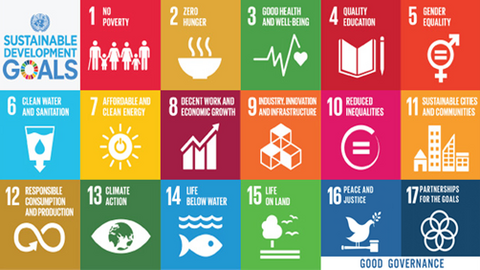
A little more explicitly, the 17 UN SDGs can be set out as below:
- Goal 1: End poverty everywhere
- Goal 2: Bring about zero hunger
- Goal 3: Promote good health and wellbeing
- Goal 4: Improve the quality of education
- Goal 5: Facilitate gender equality
- Goal 6: Provide clean water and sanitation
- Goal 7: Generate affordable and clean energy
- Goal 8: Encourage decent work and economic growth
- Goal 9: Enhance infrastructure, industry and innovation
- Goal 10: Reduce inequality in all its forms
- Goal 11: Create sustainable cities and communities
- Goal 12: Engage in responsible production and consumption
- Goal 13: Take action on climate change
- Goal 14: Conserve life below water
- Goal 15: Protect life on land
- Goal 16: Promote peace, justice and strong institutions
- Goal 17: Engender global partnerships for sustainable development
The pursuit of these SDGs may not only improve the bottom line in the corporate sector, but also advance the interests of stakeholders in the public, private and third sector. As Saks highlights in his collaborative edited book with the IRL and the United Nations Institute for Training and Research (UNITAR)5, while they are stretch targets, responsible leadership is essential to the ultimate achievement of the UN SDGs. The discursive chapters of the book span from areas such as cybercrime, good governance and responsible innovation to education, climate change and human trafficking.
Extended waiting times with 7.6 million people still on the list for routine operations and some 14,000 avoidable deaths per annum from longer waits in A&E departments.
FIGURE 2
Responsible Leadership: essential to the achievement of the United Nations Sustainable Development Goals
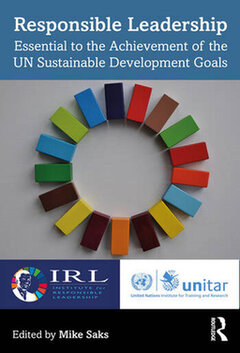
Further details of the IRL’s activities in these and other areas are available on the IRL website. Since health is one of the key SDGs which underlies a number of the other goals and is also discussed extensively in this book, it is proposed to highlight the importance of responsible leadership in relation to the presently ailing National Health Service (NHS) in Britain, the travails of which have become a major issue of public concern.
The pioneering NHS, implemented in 1948 in Britain and free at the point of access, has been the shining reference point for other NHSs formed at a later date throughout the Western world.
Our ailing National Health Service
The pioneering NHS, implemented in 1948 in Britain and free at the point of access, has been the shining reference point for other NHSs formed at a later date throughout the Western world. However, in the last couple of decades the NHS has been in decline to the detriment of stakeholders who heavily depend on it for their health and wellbeing. It is therefore no surprise that the sustainability of the British NHS has been brought into question by the report by Lord Darzi6 in 2024 that wascommissioned for England on an eight-week timescale by the new Labour government of that year.
FIGURE 3
The 2024 Darzi Review
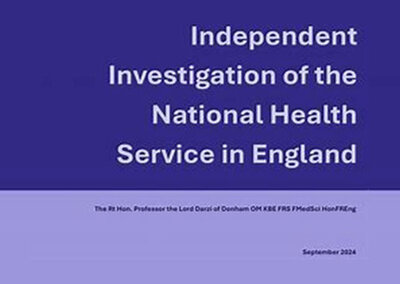
This review identified many key failings with the examples set out below:
- Crumbling Victorian hospital buildings in various states of disrepair and desperate need of modernisation.
- Extended waiting times with 7.6 million people still on the list for routine operations and some 14,000 avoidable deaths per annum from longer waits in A&E departments.
- Unproductive hospitals where no more operations were performed despite a 17% increase in the hospital workforce over the past five years.
- A need to more strongly prioritise prevention with an ageing population and rising rates of chronic illnesses.
- More resources required in primary care, where the number of community nurses fell by 5% compared to an increase of 35% hospital nurses in 2019 to 2023.
- The collapse of social care, which is means-tested and placing an increasing burden on families and the NHS – not least by hospital bed blocking.
- Technology deficits in the wake of AI and other developments which place the NHS well behind the private sector in many areas and increase waiting lists.
It is self-confessedly felt that this target, unless matched by more fulsome actions on a wider front, could lead to the displacement of other aspects of the NHS such as cutting local health services, especially if shortening A&E waiting times is prioritised.
Central to resolving these issues sustainably is radical reform and investment. Pleasingly, the new government has taken some short range steps to progress the agenda. It also has a target by 2029 of carrying out 92% of routine operations and appointments within 18 weeks. Against this, it is self-confessedly felt that this target, unless matched by more fulsome actions on a wider front, could lead to the displacement of other aspects of the NHS such as cutting local health services, especially if shortening A&E waiting times is prioritised. Amongst many other things, innovative approaches to care will need to be adopted and a more supportive, rather than adversarial, approach to top-level managers may be required.
Although there are always going to be dilemmas over resource allocation with new and existing developments in healthcare, these are worthy ambitions for both our own and other health services to achieve sustainability for healthy and inclusive living for the benefit of users.
The need for an international frame of reference
One dimension of how to move things forward that has received too little attention is the power of learning from lessons internationally. This is underlined by the recent co-edited book7 by Giarelli and Saks which importantly focuses on the challenges, reforms and future prospects of the NHSs of Western Europe including in countries spanning from Sweden, Denmark and Norway in Scandinavia to Spain, Portugal, Italy and Greece in the Mediterranean macro-region.
FIGURE 4
The National Health Services of Western Europe:
Challenges, Reforms and Future perspectives
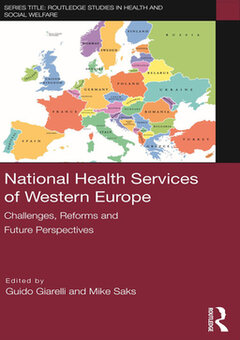
This is one of a number of helpful recent books in which Saks has been involved on comparative health policy8 covering countries as diverse as India, Japan and the United States.In addition, he has taken a lead policy role on the Technical Expert Group of the World Health Organization in providing its first ever guidance on global health practitioner regulation based on an extensive commissioned international review9 of 410 peer-reviewed articles and more than 400 items of grey literature.
FIGURE 5
Health Practitioner Regulation: Design, Reform and Implementation Guidance
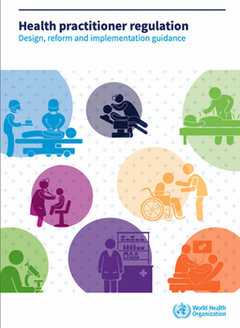
There are many future pointers arising from this international experience for responsible leaders in government and the NHS in Britain, such as:
- Ensuring adequate regulation of professions and support workers to protect the public
- Encouraging collaborative working as opposed to a destructive silo-based approach
- Striking an appropriate balance between centralisation and decentralisation
- Addressing inequalities between groups and regions in different parts of the country
- Increasing the influence of the patient voice in healthcare decision making
- Making sure that our health services are sufficiently funded and regularly upgraded.
Although there are always going to be dilemmas over resource allocation with new and existing developments in healthcare, these are worthy ambitions for both our own and other health services to achieve sustainability for healthy and inclusive living for the benefit of users.
Conclusion
It is no coincidence that the logo for the IRL includes an image of Nelson Mandela – a much revered responsible leader who very humbly and commendably brokered the end of apartheid with F. W. de Klerk in South Africa after twenty-seven years in jail for his subversive activities.
FIGURE 6
The logo of the Institute for Responsible Leadership
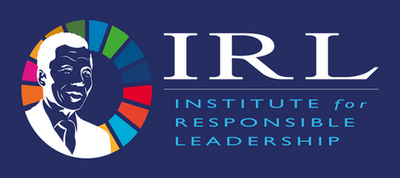
In dealing with the crisis in our NHS in particular and advancing the UN’s SDG 3 in health and wellbeing – while acknowledging the political debate about the source of the problems – we need in Mandela’s words, to let bygones be bygones at the appropriate point in time. We can then move on to systematically address the issues in an informed way in the public interest. This will take time, but identifying what the issues are is a critical staging post in providing for their resolution. In the broader frame of reference of the IRL, which aims to work in the interests of all relevant stakeholders, this will involve clear commitment and milestones to chart progress.
References
1 Saks, M. and Search-Whittaker, J. (2018) ‘Responsible leadership in challenging times’, Innovation Review, December.
2 Grant Thornton (2019) Corporate Governance and Company Performance, London: GT.
3 Kempster, S., Maak, T. and Parry, K. (eds) (2020) Good Dividends: Responsible Leadership of Business Purpose, Abingdon: Routledge.
4 United Nations (2015) Transforming Our World: The 2030 Agenda for Sustainable Development, Geneva: UN.
5 Saks, M. (ed) (2023) Responsible Leadership: Essential to the Achievement of the United Nation’s Sustainable Development Goals, Abingdon: Routledge.
6 Professor Lord Darzi (2024) Independent Investigation of the National Health Service in England, London: Department of Health and Social Care.
7 Giarelli, G. and Saks, M. (eds) (2024) National Health Services of Western Europe: Challenges, Reforms and Future Perspectives, Abingdon: Routledge.
8 See, for example, Saks, M. (2015) The Professions, State and the Market: Medicine in Britain, the United States and Russia, Abingdon: Routledge; Chamberlain, J. M., Dent, M. and Saks, M. (eds) (2018) Professional Health Regulation in the Public Interest: International Perspectives, Bristol: Policy Press; Saks, M. (ed) (2020) Support Workers and the Health Professions in International Perspective: The Invisible Providers of Health Care, Bristol: Policy Press.
9 World Health Organization (2024) Health Practitioner Regulation: Design, Reform and Implementation Guidance, Geneva: WHO.

Professor Mike Saks BA, MA, PhD, FIKE, FIoD, FIRL, FRBC, FRCCM, FRSA
Chair of the Institute for Responsible Leadership
Emeritus Professor
University of Suffolk, UK
& Visiting Professor
University of Westminster, UK
University of York, UK
University of Toronto, Canada

Julie Search-Whittaker BEd, MA, FIRL
Chief Executive of the Institute for Responsible Leadership